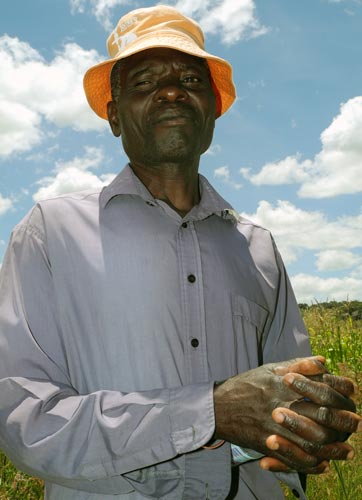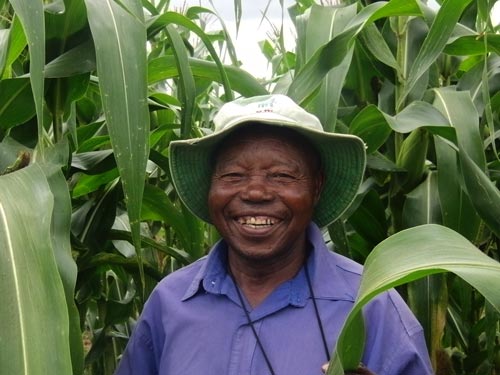Low soil fertility: Problems and progress
 Tunga Silvar grows maize to feed his wife and fourgrandchildren on about 0.5 hectares of land in Mawanga, Zimbabwe, a hilly area some 45 kilometers northeast of Harare. Like otherfarmers in the region, he is acutely aware of the value of nitrogen fertilizer, continually juggles his limited household financesto get it, and is poorer and hungrier when he can’t. “We used to sell maize, but in the last five years we haven’t been able to do so,” saysSilvar. “I had to pay school fees for my grandchildren, so I couldn’t buy fertilizer. Fertilizer is very important, especially in our type of soil. If you don’t apply it, youcan barely harvest anything.”
Tunga Silvar grows maize to feed his wife and fourgrandchildren on about 0.5 hectares of land in Mawanga, Zimbabwe, a hilly area some 45 kilometers northeast of Harare. Like otherfarmers in the region, he is acutely aware of the value of nitrogen fertilizer, continually juggles his limited household financesto get it, and is poorer and hungrier when he can’t. “We used to sell maize, but in the last five years we haven’t been able to do so,” saysSilvar. “I had to pay school fees for my grandchildren, so I couldn’t buy fertilizer. Fertilizer is very important, especially in our type of soil. If you don’t apply it, youcan barely harvest anything.”
After water, nitrogen is the single most important input for maize production. In sub-Saharan Africa where fertilizer use is negligible, improved maize with tolerance to low nitrogen (N) conditions could give maize farmers more abundant harvests, greatly improving their food security and livelihoods.
Improved Maize for African Soils (IMAS), a project funded by the Bill & Melinda Gates Foundation and USAID and conducted jointly with the KenyanAgricultural Research Institute (KARI), South Africa’s Agricultural Research Council (ARC), and the DuPont Company Pioneer Hi-Bred, aims to overcome theseproblems by developing hybrids with 25-50 % more yield than current commercial seed in low-N soils. The second annual IMAS meeting in Harare in lateFebruary 2012 drew more than 40 scientists from these organizations and CIMMYT to review progress and develop shared work plans for the following year.
Accomplishments to date include establishment of a low N phenotyping network across eastern and Southern Africa and application of cutting-edgemolecular breeding techniques for low N tolerance. Several recently-identified, low-N tolerant inbred lines from diverse genetic backgrounds are being used in new hybrid combinations and to initiate pedigree breeding. New and existing elite hybrid combinations and synthetics are being evaluated inthe regional low N phenotyping network, which now has access to more than 60,000 rows in N-depleted plots of experiment stations region-wide. Over thepast year CIMMYT maize breeders Bish Das and Amsal Tarekegne have engaged several additional seed companies in work on low-N tolerant maize.As part of this, representatives from 11 companies in eastern and southern Africa attended a field day in Harare to showcase the latest products and highlightnew support from the Foundation to scale-up seed production for existing commercial or advanced hybrids and OPVs that perform well in low N fields.

Strengthening Malawi’s seed sector
Seed companies provide the vital link to get improved maize varieties into farmers’ hands. A major focus of the Drought Tolerant Maize for Africa (DTMA) project has been to strengthen small- and intermediate-scale seed enterprises and thereby speed delivery of drought tolerant varieties. The project has provided training and help to develop business plans (“road maps” for seed delivery), improved drought tolerant hybrids, and assistancein seed production. As one example of the benefits of this approach, three years of support in seed production and business planning have helped theseed company Demeter in Malawi go from strength to strength. The company now produces over 2,000 tons of seed, and its portfolio includes the open pollinated varieties ZM309, ZM523, and ZM721 developed under DTMA.
New companies are also appearing on the scene. One example is Funwe Farm, a company that is starting to grow with support from CIMMYT and the Programme for Africa’s Seeds Systems of the Alliance for a Green Revolution in Africa (AGRA-PASS). John MacRobert, seed systems specialist for sub-Saharan Africa, andAmsal Tarekegne visited Funwe’s seed production fields to smooth out initial teething problems in the production of foundation seed of a CIMMYT hybridreleased by the Malawi government as MH26. “By supporting companies like Demeter and Funwe we are helping to ensure farmers get access to improvedvarieties,” said MacRobert. “Our partnerships with seed companies are really starting to pay off.”
On-farm performance: the definitive challenge of breeding
 Late and erratic rainfall in Zimbabwe has many farmers facing the prospect of poor harvests. The current hardships from drought though may furnish some hopefor farmers. New drought tolerant varieties are being tested in on-farm trials under farmer management. Many of the trials are experiencing drought stress—aperfect opportunity to identify the best varieties for such harsh conditions. A recent visit to on-farm trials in the Murewa District of Zimbabwe showed many new drought tolerant products performing well. Local farmer Sailas Ruswa is growing a trial and was enthusiastic about what he saw: some varieties showedsigns of severe drought stress, but a few were holding up well and were expected to produce good yields.
Late and erratic rainfall in Zimbabwe has many farmers facing the prospect of poor harvests. The current hardships from drought though may furnish some hopefor farmers. New drought tolerant varieties are being tested in on-farm trials under farmer management. Many of the trials are experiencing drought stress—aperfect opportunity to identify the best varieties for such harsh conditions. A recent visit to on-farm trials in the Murewa District of Zimbabwe showed many new drought tolerant products performing well. Local farmer Sailas Ruswa is growing a trial and was enthusiastic about what he saw: some varieties showedsigns of severe drought stress, but a few were holding up well and were expected to produce good yields.
 Capacity development
Capacity development 
